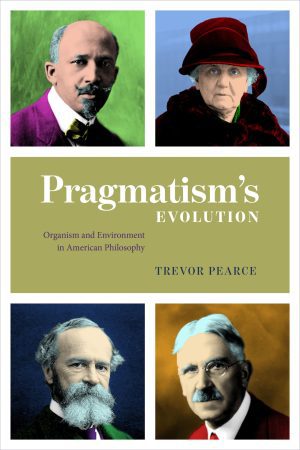Trevor Pearce, Ph.D.
CLAS IS NOW TWO NEW COLLEGES
CLAS has transitioned into the College of Science and the College of Humanities & Earth and Social Sciences.
Thank you for your patience as we sunset this website over the 23-24 academic year.
“Pragmatism’s Evolution: Organism and Environment in American Philosophy”
Tuesday, March 26
7 p.m.
Reception at 6 p.m.
Open to the public at no charge.
The Dubois Center at UNC Charlotte Center City
320 E. 9th Street, Charlotte, NC 28202
Parking and Light Rail Information
(Best viewed horizontally in a mobile environment.)
Register; Join the Mailing List

Decisive, action-oriented professionals throughout Charlotte will appreciate the philosophical tradition of pragmatism, which says that concepts and theories should be valued in terms of the concrete results they produce. Instead of ruminating, the pragmatist puts ideas into action, often with impressive results, as evidenced by names you probably recognize: W. E. B. Du Bois, a trailblazing Black public intellectual, helped found the NAACP in 1910; John Dewey, best known for his work on children’s education, was on the cover of Time magazine in 1928; Jane Addams, a relentless advocate of social and labor reform, received the Nobel Peace Prize in 1931.
All of these thinkers were in dialogue with Charles Darwin and new developments in biology. In 1909, fifty years after On the Origin of Species appeared, Dewey went so far as to say that Darwin’s book had overturned two thousand years of philosophy. But why should anyone think that progress in empirical science is relevant to age-old theories of knowledge, society, and the good life?
In Pragmatism’s Evolution, Trevor Pearce, Ph.D., explains how a select group of American philosophers attempted to answer this question. From 1860 to 1910, Dewey and other philosophers now associated with an approach called ‘American pragmatism’ actively participated in a series of debates in biology, arguing over everything from the instincts of honeybees to the inheritance of acquired characteristics. In tandem with philosophically inclined social scientists such as Addams and Du Bois, they argued that the new science of evolution promised to reshape not only our social and ethical theories but even our account of knowledge and scientific inquiry itself. Popular debates about eugenics, the push to reintroduce creationism and intelligent design into schools, and ethical and political questions in fields like psychology and sociology demonstrate that evolutionary biology remains a hot topic today, over a hundred years later.
Trevor Pearce, Ph.D. is Chair and Associate Professor of Philosophy at the University of North Carolina at Charlotte. His research focuses on historical connections between philosophy, biology, and the social sciences from roughly 1840 to 1920, especially in the United States. He received his Ph.D. in Conceptual and Historical Studies of Science from the University of Chicago in 2010. Pragmatism’s Evolution, his first book, was funded by a Scholars Award from the National Science Foundation. He is currently writing about the scientific interests of American women philosophers such as Grace Andrus de Laguna and about the scientific context of the work of Alain Locke, father of the Harlem Renaissance. You can learn more about his scholarship at http://www.trevorpearce.com/.

All Personally Speaking published experts series events are hosted by the College of Humanities & Earth and Social Sciences with The Dubois Center at UNC Charlotte Center City and J. Murrey Atkins Library. During these community talks, College of Humanities & Earth and Social Sciences faculty engage audiences in conversation about their research findings and describe the personal motivations for writing their books. The presentation may be recorded. During these community talks, College of Humanities & Earth and Social Sciences faculty engage audiences in conversation about their research findings and describe the personal motivations for writing their books. The presentation may be recorded.
The author welcomes questions and comments about the book (Pearce, Trevor. Pragmatism’s Evolution: Organism and Environment in American Philosophy. University of Chicago Press, 2020), which will be available for sale at the event. Or request the book from your local library. It is not necessary to have read the book before attending.